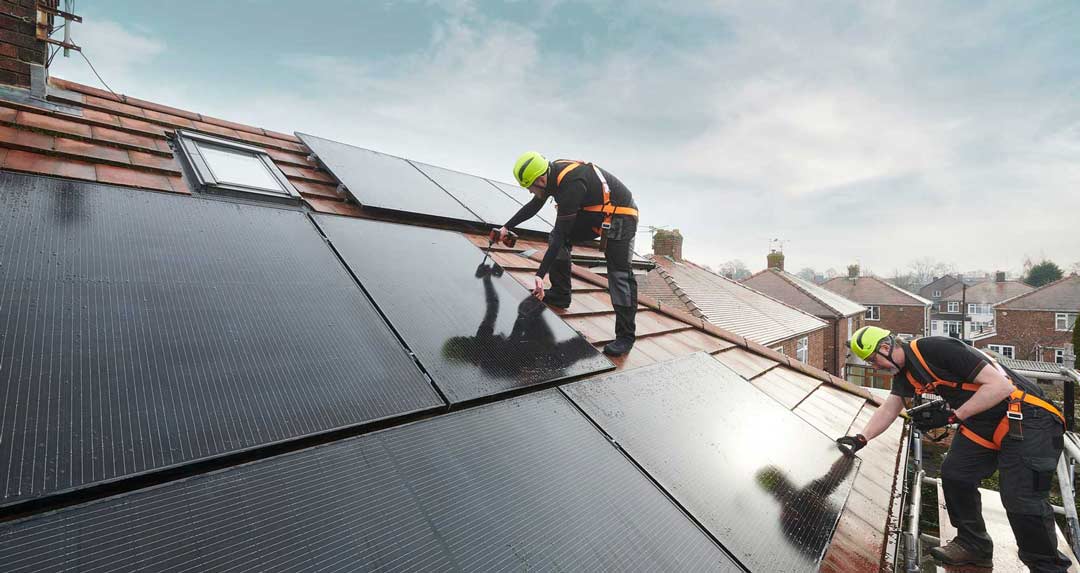Solar power has become more efficient, with researchers investigating technology such as lunar energy capture, solar trees, and other groundbreaking energy collection techniques. These advancements have given rise to several types of solar panels, each with strengths and weaknesses. However, the glut of options can make a solar adopter’s shopping experience a lot more complicated. To make an informed decision on which panels to purchase, homeowners need to understand the pros and cons of each type. This guide breaks down the variations and their benefits so you can know which solar panels are best for you.
[su_box title=”RELATED:” box_color=”#4AC1E0″ title_color=”#000000″]Solar 101: How Does Solar Work?
[/su_box]
What Are the Types of Solar Panels?
There are two types of solar panels: monocrystalline and polycrystalline. Both are similar, but monocrystalline panels offer improved energy output — a significant factor when choosing which solar panels to install. Here’s a more in-depth look at the differences between the two:
Monocrystalline Solar Panels
Monocrystalline panels have become market leaders for optimal energy output, though they are more expensive than their polycrystalline counterparts. They’re the best solution for homeowners with limited space, as they offer the maximum power per square foot, though the high yield is also an excellent benefit for larger homes. Monocrystalline panels are recognizable thanks to their deep black hue, as opposed to the blue of polycrystalline panels. Typically, your investment in these panels pays off in less than 5 years, though the length can vary depending on how you pay.
Monocrystalline solar panels are known for their efficiency and durability, among other benefits. Here are some key advantages:
- High Efficiency: Monocrystalline solar panels are typically the most efficient. They have the highest efficiency rates, meaning they convert a higher percentage of sunlight into electricity compared to other types, such as polycrystalline or thin-film solar panels.
- Longevity and Durability: These panels are known for their long lifespan. Many monocrystalline panels come with warranties of 25 years or more, and they can continue to function effectively even beyond that period.
- Better Performance in Low-Light Conditions: Monocrystalline solar panels perform better than other types in low-light conditions, such as on cloudy days or in areas with less direct sunlight.
- Aesthetics: Monocrystalline panels have a uniform look, typically characterized by a black hue, which many people find more visually appealing compared to the blue hue of polycrystalline panels.
- Temperature Coefficient: They generally have a lower temperature coefficient than other panels. This means their performance declines less in high-temperature conditions.
- Potential for Higher Power Output: Monocrystalline panels often come in higher wattage options, which means you can get more power output per panel, beneficial for installations with limited space.
Polycrystalline Solar Panels
Polycrystalline panels are more budget-friendly than their monocrystalline counterparts, which can result in a higher return on investment for certain homes. However, they don’t generate as much energy, which makes them less desirable for homes with high energy needs. They tend to underperform in extreme heat, which should be a consideration for anyone living in a warmer climate.
Polycrystalline solar panels, while generally less efficient than monocrystalline panels, offer a range of benefits that make them a popular choice for many solar energy applications:
- Cost-Effective: One of the primary benefits of polycrystalline solar panels is their lower cost compared to monocrystalline panels. The manufacturing process of polycrystalline silicon is more straightforward and less expensive, which translates to lower prices for consumers.
- Eco-Friendly Manufacturing Process: The production process of polycrystalline solar panels is more environmentally friendly than that of monocrystalline panels.
- Moderate Efficiency: While polycrystalline panels are less efficient than monocrystalline panels, they still offer moderate efficiency suitable for residential and commercial applications, especially in areas where space is not a constraint.
- Good Performance in Moderate Climates: Polycrystalline solar panels perform well in moderate climates.
- Durability: Similar to monocrystalline panels, polycrystalline solar panels are durable and long-lasting. They usually come with warranties of 25 years or more.
Where Can I Put Solar Panels?
You have two options when it comes to placing solar panels: roof mounting and ground mounting. However, you’ll generally want to roof-mount your solar panels, as that tends to be clear of obstructions such as trees and debris and doesn’t take up as much space as ground-mounted panels.
Roof Mounted Solar Panels
Rooftop installations are popular, utilizing the home’s rooftop to capture sunlight without impeding ground space. They’re usually more cost-effective than ground mounts, demanding less additional equipment. A vital prerequisite is a sturdy, healthy roof to support the panels. When you work with a solar installer, they’ll help you determine whether your roof needs to be replaced before installing panels. To be clear, solar panels won’t damage your roof and can even help extend its lifespan.
Roof-mounted solar panels offer several benefits, making them popular for residential and commercial solar installations. Here are some of their key advantages:
- Space Efficiency: Roof-mounted solar panels are space-efficient, allowing homeowners to keep their yards free of panels.
- Aesthetic Integration: Modern solar panels are more aesthetically pleasing than previous iterations and can even look like shingles.
- Increased Property Value: Homes with solar panels are more valuable than those without them, and they’re increasingly in demand among buyers.
Ground Mounted Solar Panels
Ground mounts are for homes that can’t support roof mounts due to wear and tear, an incorrect roof pitch, or obstructions like trees. The energy output from ground-mounted panels is (usually) similar to rooftop panels, but ground mounts generally cost more due to excavation for wire routing and the need for panel framing. However, they can be helpful in situations such as farming, where covering a large area is necessary.
Here are some other advantages:
- Optimal Orientation and Tilt: Ground-mounted systems can be positioned and angled for maximum sun exposure, as the orientation and angle of a roof do not limit them. T
- Ease of Maintenance: Ground-mounted panels are generally easier to access for maintenance, cleaning, and repair than roof-mounted systems. This accessibility can lead to better upkeep and longer panel lifespans.
- Cooling Advantage: Ground-mounted panels typically have better airflow around them compared to roof-mounted panels. This can help keep the panels cooler, improving efficiency and reducing the risk of overheating.
At Purelight Power, we strive to help you make the best home solar installation decisions. With robust financing options and expertise in solar incentive programs, we can help you find the best solution for your home at the best possible price. Contact us today if you want to know more about solar, and we’ll help you get started on your green energy journey.
[su_box title=”MORE:” box_color=”#4AC1E0″ title_color=”#000000″]Solar 101: Do Solar Panels Work in Winter?[/su_box]




